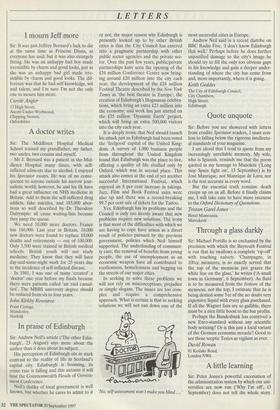In praise of Edinburgh
Sir: Andrew Neil's article (`The other Edin- burgh', 23 August) says more about the author than it does about its subject.
His perception of Edinburgh sits in stark contrast to the reality of life in Scotland's capital city. Edinburgh is booming, its crime rate is falling and this autumn it will host the Commonwealth Heads of Govern- ment Conference.
Neil's dislike of local government is well known, but whether he cares to admit to it or not, the major reason why Edinburgh is presently looked up to by other British cities is that the City Council has entered into a pragmatic partnership with other public sector agencies and the private sec- tor. Over the past few years, public/private partnerships have seen the opening of the £34 million Conference Centre now bring- ing around £20 million into the city each year; the development of the £24 million Festival Theatre described by the New York Times as 'the best theatre in Europe'; the creation of Edinburgh's Hogmanay celebra- tions, which bring an extra £23 million into the economy; and work has just started on the £35 million 'Dynamic Earth' project, which will bring an extra 500,000 visitors into the city each year.
It is deeply ironic that Neil should launch his attack just as Edinburgh had been voted the `feelgood' capital of the United King- dom. A survey of 1,000 business people from throughout the United Kingdom found that Edinburgh was the place to live, offering a quality of life rivalled only by Oxford, which was in second place. This attack also comes at the end of yet another successful International Festival, which enjoyed an 8 per cent increase in takings. Jazz, Film and Book Festival sales were also up and there was a record-breaking 99.7 per cent sale of tickets for the Tattoo.
Yes, Edinburgh has its problems and the Council is only too keenly aware that new problems require new solutions. The irony is that most of the difficulties with which we are having to cope have arisen as a direct result of policies pursued by the previous government, policies which Neil himself supported. The underfunding of communi- ty care, the removal of benefits from young people, the use of unemployment as an economic weapon have all contributed to rootlessness, homelessness and begging on the streets of our major cities.
In seeking to solve these problems we will not rely on misconceptions, prejudice or simple slogans. The issues are too com- plex and require a comprehensive approach. What is certain is that in seeking solutions we will not run down one of the No, self-assessment won't make you blind . ' most successful cities in Europe.
Andrew Neil said in a recent diatribe on BBC Radio Five, 'I don't know Edinburgh that well.' Perhaps before he does further unjustified damage to the city's image he should try to fill the only too obvious gaps in his knowledge and gain a deeper under- standing of where the city has come from and, more importantly, where it is going. Keith Geddes
The City of Edinburgh Council, City Chambers, High Street, Edinburgh


































































 Previous page
Previous page